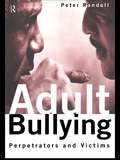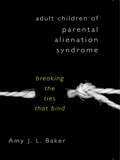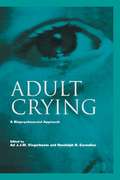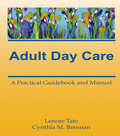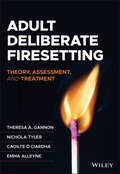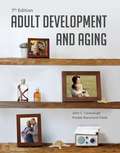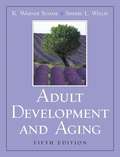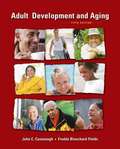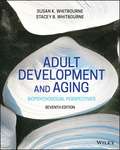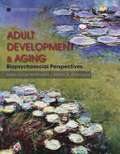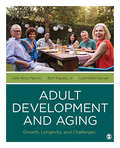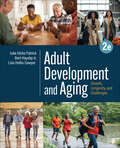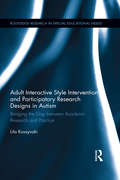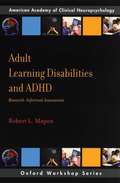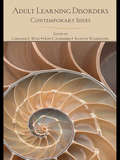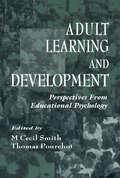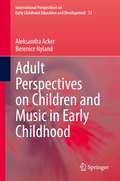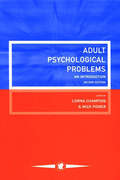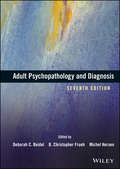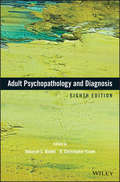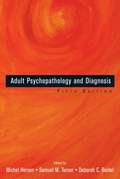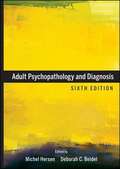- Table View
- List View
Adult Bullying: Perpetrators and Victims
by Peter RandallThe frequency and severity of personal harrassment is a problem that is only just beginning to be uncovered. In Adult Bullying, psychologist Peter Randall uses the voices of both bullies and victims to reveal the misery that many adults endure. He describes the processes that turn child bullies into adult bullies, often aware of their behaviour but unable to stop it. The workplace and the neighbourhood replace the playground, but the tactics and patterns of reward remain the same. The adult victim has little or no more power than the child counterpart, often changing jobs to escape the attentions of the bully. Similarly, managers like teachers, often fail to tackle the complaints of the victim with the seriousness the problem deserves, preferring to believe that the fuss is unwarranted. Adult Bullying will be welcomed by managers, counsellors, social workers and anyone who has experienced personal harrassment. Effective ways to deal with bullying in the community and the workplace are discussed, with particular attention given to the implications for managers and employees.
Adult Children of Parental Alienation Syndrome: Breaking the Ties That Bind
by Amy J. BakerAn examination of adults who have been manipulated by divorcing parents. Parental Alienation Syndrome (PAS) occurs when divorcing parents use children as pawns, trying to turn the child against the other parent. This book examines the impact of PAS on adults and offers strategies and hope for dealing with the long-term effects.
Adult Crying: A Biopsychosocial Approach
by Ad J.J.M. Vingerhoets Randolph R. CorneliusCrying is a typical human expression of emotion. Surprisingly, until now little scientific attention has been devoted to this phenomenon. Many textbooks on emotion fail to pay attention to it, and in scientific journals there are hardly any contributions focusing on this behavior. In contrast, there is much interest from the lay public, allowing pseudo-scientists to formulate theories that have little or no scientific basis. Is there any evidence in support of statements that crying is healthy or that not crying may result in toxification? How do people react to the crying of others? Is crying important for the diagnosis of depression, and if so, how? This book aims to fill this gap in scientific literature. Crying is discussed from several perspectives and specific attention is given to methodological issues and assessment. Each chapter provides a review and a summary of the relevant scientific literature.
Adult Day Care: A Practical Guidebook and Manual
by Lenore A Tate Cynthia M BrennanIntended for long-term care providers, consumers, and gerontology students, this valuable new guidebook and manual encourages the promotion and enhancement of adult day care as an essential link in long-term care. Since the early 1970s, the number of adult day care centers in the United States has grown from 20 to more than 620. This rapid increase in adult day care programs indicates that it is an important health care and social resource that has begun to fill a necessary gap in the long-term care system. To further meet the increasing needs, this new book provides information regarding the history, definition, and concept of adult day care; models of care; scope of activities; state and national policy; and samples of forms and reports needed for daily operations.
Adult Deliberate Firesetting: Theory, Assessment, and Treatment (Wiley Series in Forensic Clinical Psychology)
by Theresa A. Gannon Nichola Tyler Caoilte Ó Ciardha Emma AlleyneADULT DELIBERATE FIRESETTING Explore the theoretical foundations of—and discover effective treatment options for—adults who deliberately set fires In Adult Deliberate Firesetting: Theory, Assessment, and Treatment, a team of distinguished researchers deliver a comprehensive exploration of individuals who intentionally set fires. The book covers major theories on the motivations and processes involved in firesetting, as well as the assessment and treatment of patients and clients who demonstrate this behaviour. The treatment portion of the book focuses on a strengths-based rehabilitative approach that rests on the assumption that criminogenic and human needs are inextricably intertwined. Readers will find common challenges faced by practitioners in recruiting and facilitating group-based treatment for people who have set fires. Readers will also benefit from the inclusion of: A thorough introduction to deliberate firesetting, including its definitions, terms, and labels Comprehensive explorations of the key characteristics and clinical features of people who deliberately set fires Practical discussions of theories of deliberate firesetting, including effective psychological theory and typological explanations of firesettings In-depth examinations of best practice risk assessments in defendants, and patients who deliberately set fires Perfect for psychology researchers and practitioners, Adult Deliberate Firesetting: Theory, Assessment, and Treatment will also earn a place in the libraries of psychiatrists, forensic psychologists, social workers, and others involved in the assessment and treatment of adults.
Adult Development And Aging
by Fredda Blanchard-Fields John CavanaughWritten within a bio-psychosocial framework, Cavanaugh and Blanchard-Fields' best-selling book covers the specific ages-stages of adult development and aging. In its unparalleled coverage of current research and theory, the authors draw clear connections between research and application. The book's focus on "positive aging" and the gains and losses people experience across adulthood distinguish it from its competitors.
Adult Development and Aging (Fifth Edition)
by K. Warner Schaie Sherry L. WillisThis comprehensive book helps readers process a clear picture of adult development and aging with the help and results of intensive scientific research. It challenges common stereotypes about this subject matter, and interprets the research data into an optimistic yet realistic appraisal of the many problems faced by the elderly in today's society. Chapter topics look at independence and intimacy in young adulthood; responsibility and failure in the middle years; the reintegration or despair of later life; research methodology; families; careers; personality development; learning and memory; intellectual and biological development; mental disorders; and death and bereavement. For individuals who want to view the potential richness of life--at all stages, and/or understand the lives of older adults they may care for.
Adult Development and Aging (fifth edition)
by John C. Cavanaugh Fredda Blanchard-FieldsHaving a solid grounding in research and theory about Adult Development and Aging is essential even for understanding the evening news.
Adult Development and Aging: Biopsychosocial Perspectives
by Susan Krauss Whitbourne Stacey B. WhitbourneThe process of successful aging involves being able to overcome the threats to physical and psychological well-being presented by the aging process. Successful aging also involves the ability to become engaged with life in terms of both relationships and productive activity; successful cognitive aging refers to individuals who perform above average compared to their age group. Subjective well-being, a component of successful aging, is higher in older adults, a phenomenon referred to as the paradox of well-being. The WHO's movement to foster global age-friendly environments will make it possible for more individuals to feel connected to their communities and be able to fulfill their personal goals, regardless of age. The seventh edition of Adult Development and Aging: Biopsychosocial Perspectives incorporates material that we believe is vital to our understanding of this rapidly developing and fascinating field of study.
Adult Development and Aging: Biopsychosocial Perspectives (4th Edition)
by Susan Krauss Whitbourne Stacey B. WhitbourneThe fourth edition continues to provide psychologists with a fresh and engaging approach to the field of psychology of adult development and aging. It focuses on three themes: a multidisciplinary approach, positive images of aging, and the newest and most relevant research. Recent articles and updates to the information on demography, economics, and public policy are presented. The Aging in the News feature includes a story of a remarkable achievement by a middle-aged or older adult. The Assess Yourself boxes are also updated with new questions. Psychologists appreciate this mix of examples and discussions that make the material come to life.
Adult Development and Aging: Growth, Longevity, and Challenges
by Lisa Hollis-Sawyer Bert Hayslip Julie Hicks PatrickTopically organized, Adult Development and Aging: Growth, Longevity and Challenges provides students with a comprehensive understanding of the aging process in adulthood from multiple perspectives. The authors use principles of lifespan development to show readers the directionality of changes in early, middle, and late adulthood. Within its framework of scientific literacy, the text charts four key themes to guide learners: a focus on aging as development; a global perspective on contexts; a vibrant, integrated approach to diverse coverage; and psychological science that translates into real-life experiences. A final chapter focuses on ways to improve the experience of aging for all adults. Included with this title: The password-protected Instructor Resource Site (formally known as SAGE Edge) offers access to all text-specific resources, including a test bank and editable, chapter-specific PowerPoint® slides.
Adult Development and Aging: Growth, Longevity, and Challenges
by Lisa Hollis-Sawyer Bert Hayslip Julie Hicks PatrickTopically organized, Adult Development and Aging: Growth, Longevity and Challenges provides students with a comprehensive understanding of the aging process in adulthood from multiple perspectives. The authors use principles of lifespan development to show readers the directionality of changes in early, middle, and late adulthood. Within its framework of scientific literacy, the text charts four key themes to guide learners: a focus on aging as development; a global perspective on contexts; a vibrant, integrated approach to diverse coverage; and psychological science that translates into real-life experiences. A final chapter focuses on ways to improve the experience of aging for all adults. Included with this title: The password-protected Instructor Resource Site (formally known as SAGE Edge) offers access to all text-specific resources, including a test bank and editable, chapter-specific PowerPoint® slides.
Adult Development and Aging: Growth, Longevity, and Challenges
by Lisa Hollis-Sawyer Bert Hayslip Julie Hicks PatrickTopically organized, Adult Development and Aging: Growth, Longevity and Challenges provides students with a comprehensive understanding of the aging process in adulthood from multiple perspectives. In this Second Edition, Julie Hicks Patrick, Bert Hayslip, and Lisa Hollis-Sawyer use principles of lifespan development to show readers the directionality of changes in early, middle, and late adulthood. Within its framework of scientific literacy, the text charts four key themes to guide learners: a focus on aging as development; a global perspective on contexts; a vibrant, integrated approach to diverse coverage; and psychological science that translates into real-life experiences. A final chapter focuses on ways to improve the experience of aging for all adults.
Adult Interactive Style Intervention and Participatory Research Designs in Autism: Bridging the Gap between Academic Research and Practice (Routledge Research in Special Educational Needs)
by Lila KossyvakiRegardless of their cognitive and linguistic abilities, people with autism can often find it difficult to develop basic communicative skills that are necessary to gain full control over their environment and maintain their independence. Building on the author’s own cutting-edge research, Adult Interactive Style Intervention and Participatory Research Designs in Autism examines the impact that the interactive style of neurotypical individuals could have on the spontaneous communication of children with autism. This book provides clear and detailed guidance on how to conduct research into autism in real-world settings such as schools and homes. Kossyvaki critically evaluates a wealth of relevant case studies and focuses on a number of methodological issues that researchers are likely to face when carrying out research of this complex nature. The author walks the reader through present literature on the importance of spontaneous communication and the atypical way that this tends to develop in autism, before bringing the results of her own research to bear on the question of how the interactive styles of neurotypical individuals can impact on the spontaneous communication of people with autism. Adult Interactive Style Intervention and Participatory Research Designs in Autism is essential reading for academics, researchers, and postgraduate students in the fields of special educational needs, inclusion, autism, research methods, and educational and clinical psychology.
Adult Learning Disabilities and ADHD: Research-Informed Assessment
by Robert L. MapouThe book provides scientific and practical guidance on assessing learning disabilities and ADHD in adults. Topics include definitions of disability, assessment, and management approaches (from medications and therapy to educational and workplace accommodations), and assistive technology and software. The book is aimed at clinical neuropsychologists and clinical psychologists who are involved in the assessment and management of adults with learning disabilities and ADHD.
Adult Learning Disorders: Contemporary Issues
by Lorraine E. WolfRecent advances in neuroimaging and genetics technologies have enhanced our understanding of neurodevelopmental disorders in adults. The authors in this volume not only discuss such advances as they apply to adults with learning disorders, but also address their translation into clinical practice. One cluster of chapters addresses developmental concerns as children and adolescents with learning disorders approach young adulthood. Experts discuss dyslexia, language-based and writing disorders, perhaps the most widely studied group of learning disorders, from the point of view of neuroimaging and genetic underpinnings. Chapters on the neuroscience of nonverbal, math and executive function disorders are also included. Clinically-oriented chapters with case studies, recommendations for accommodation, and considerations for evaluation follow. Study of specialized populations - such as late high school students, college, medical and law students - further demonstrate how our expanded knowledge base may be applicable to clinical practice. The heterogeneity of adults with learning disorders, the complexity of their clinical presentation and co-existing disorders are addressed from both a scientific and clinical point of view demonstrating how empirical research and clinical practice inform each other. This volume will enhance the practice of clinicians and educators working with adults with neurodevelopmental disorders, as well as providing essential current information for researchers of adults with learning disorders.
Adult Learning and Development: Perspectives From Educational Psychology (Educational Psychology Series)
by Thomas Pourchot M. Cecil SmithAdult education occurs whenever individuals engage in sustained, systematic learning in order to affect changes in their attitudes, knowledge, skills, or belief systems. Learning, instruction, and developmental processes are the primary foci of educational psychology research and theorizing, but educational psychologists' work in these domains has centered primarily on the childhood and adolescent school years. More recently, however, a number of educational psychologists have studied learning and development in adulthood. The results of these efforts have resulted in what is now called adult educational psychology. The purpose of this volume is to introduce this new subfield within educational psychology. Section 1 focuses on the interplay between learning and development in adulthood, how various forms of instruction lead to different learning outcomes for adults, description of the diverse social contexts in which adult learning takes place, and the development of metacognitive knowledge across the life span. Section 2 describes both research and theory pertaining to adult intellectual functioning, thinking, and problem-solving skills within various contexts. Section 3 describes research in a variety of adult learning domains; discusses the cognitive and behavioral dimensions of reading in adulthood and the applications of reading in real-life circumstances; examines an educational intervention developed to promote forgiveness; and relates the outcomes of an intervention designed to educate parents about their children's mathematics learning. Section 4 summarizes the themes and issues running throughout this, the first book that has sought to span the gulf between adult education, adult development, and educational psychology.
Adult Personality Growth in Psychotherapy
by Horowitz Mardi J.This book will expand your therapeutic repertoire. Once crises have been resolved, the clinician and patient explore what can change in order to increase the patient's capacities for balance, harmony and satisfaction. Adult personality growth increases self-awareness, amplifies capacities for realistic social cognition and reduces avoidances. The outcome is the achievement of a wider range of safe emotional expression and mastery of previous traumas and losses. The three parts of this book are on identity, relationships and control of emotion. The chapters illustrate how observation, formulation and technique are linked in a continuing process of deepening understanding. Vignettes give examples of what the therapist can say to help a patient, especially at difficult times in treatment. This is a cutting-edge work integrating elements from various schools of psychotherapy and studies of adult development. It links theories to pragmatic techniques and will appeal to both trainees and experienced clinicians.
Adult Perspectives on Children and Music in Early Childhood (International Perspectives on Early Childhood Education and Development #33)
by Berenice Nyland Aleksandra AckerThis book focuses on the importance and role of adults in promoting music in the early years. Designed to promote the idea of the value of music in the early childhood years, the research discussed in this book explores the experiences of a number of adults working with children from birth to age 8. The initiatives discussed in this work all focus on adults who have encouraged the development of musical identities ranging from music in the home, to musical play in the preschool years, preparing a performance with children, and programs for disadvantaged groups that use music as a communicative tool. Each chapter will start with a description of the particular setting and the protagonists’ specific skills and interests and how they came to be working with young children. Themes for the chapters have emerged from the videos and interviews conducted and consist of both reflective and affective experience. The themes include musical background, the adults' own stories, theories of childhood, and pedagogy and philosophy.
Adult Psychological Problems: An Introduction (Contemporary Psychology Ser. #Vol. 5)
by Michael Power Lorna ChampionFirst published in 2000. Routledge is an imprint of Taylor & Francis, an informa company.
Adult Psychopathology and Diagnosis
by Michel Hersen Deborah C. Beidel B. Christopher FruehProven Classic Updated to Reflect the DSM-5The accessible format, overview chapters on broader issues--such as interviewing--that affect all diagnoses, and case study approach provide the ideal support for students to examine and understand how diagnoses are reached and applied.Updated to reflect the latest neurobiological advancements in psychopathology, this edition follows the same proven chapter structure for the disorder chapters of previous editions to facilitate readers' understanding and learning. Updates include topics such as:The new Schizophrenic Spectrum designation and other psychotic disordersThe revised approach to eating disordersTwo new chapters reflect the unsettled nature of the DSM-5 for academics and clinicians alike: Chapter 21: Conditions for Further Study and Chapter 22: Alternative DSM-5 Model for Personality Disorders.Encompassing the most current research in the field, Adult Psychopathology and Diagnosis, Seventh Edition provides a thorough introduction to our current conceptualization of psychopathology and its application in clinical practice, including dimensional and categorical classifications.
Adult Psychopathology and Diagnosis
by Deborah C. Beidel B. Christopher FruehThe definitive resource for psychological diagnosis, updated with the latest research Adult Psychopathology and Diagnosis offers comprehensive coverage of psychological disorders and presents a balanced integration of empirical data and diagnostic criteria to aid in understanding diagnosis and psychopathology. Designed to support students of clinical psychology, counseling, nursing, and social work, this invaluable resource merges overviews, case studies, and examination of individual disorders in an accessible format that facilitates easy reference. Broad-reaching issues such as interviewing and cross cultural considerations are discussed in detail for their effect on the clinical presentation of every disorder and case studies illustrate how diagnoses are reached and applied in real-world clinical settings. Updated to reflect the latest advances in research, this new 8th Edition includes new coverage of personality disorders, a new chapter on the Research Diagnostic Criteria (RDOC), new authors for a number of the chapters, and contributions by leaders in the field to provide students with exceptional insight into psychopathology and diagnosis. Get up to date on the latest research based on DSM-5 categorization Easily locate and retain information with a proven chapter structure Examine a new alternative DSM-5 model for personality disorders Include cross-cultural considerations throughout investigation and diagnosis In clarifying DSM-5 classification and diagnostic guidelines while integrating leading-edge research with a case study approach, this book provides the most complete, most up-to-date reference for graduate students and practitioners alike. Thorough coverage of essential topics such as neurological foundations, dual diagnoses, eating disorders, anxiety, gender issues and more provides both theoretical insight as well as practical understanding, making Adult Psychopathology and Diagnosis once again a top resource for the field.
Adult Psychopathology and Diagnosis
by Michel Hersen Deborah C. Beidel Samuel M. TurnerThe most up-to-date coverage on adult psychopathologyAdult Psychopathology and Diagnosis, Fifth Edition offers comprehensive coverage of the major psychological disorders and presents a balanced integration of empirical data and diagnostic criteria to demonstrate the basis for individual diagnoses. The accessible format and case study approach provide the opportunity to understand how diagnoses are reached.Updated to reflect the rapid developments in the field of psychopathology, this Fifth Edition encompasses the most current research in the field including:A thorough introduction to the principles of the DSM-IV-TR classification system and its application in clinical practiceThe biological and neurological foundations of disorders and the implications of psychopharmacology in treatmentIllustrative case material as well as clinical discussions addressing specific disorders, diagnostic criteria, major theories of etiology, and issues of assessment and measurementCoverage of the major diagnostic entities and problems seen in daily clinical work by those in hospitals, clinics, and private practiceA new chapter on race and ethnicity by renowned expert Stanley Sue
Adult Psychopathology and Diagnosis
by Michel Hersen Deborah C. BeidelThe most up-to-date coverage on adult psychopathologyNow in its sixth edition, Adult Psychopathology and Diagnosis offers comprehensive coverage of the major psychological disorders and presents a balanced integration of empirical data and diagnostic criteria to demonstrate the basis for individual diagnoses. The accessible format, overview chapters on broader issues--such as interviewing--that affect all diagnoses, and case study approach provide the ideal support for students to examine and understand how diagnoses are reached and applied.Updated to reflect the latest advancements in psychopathology, this edition offers contributions by internationally renowned leaders in the field, thirty percent of whom are new to this edition. Coverage is featured of essential topics, including:Neurobiological foundations of disordersThe problem of dual diagnosesExpanded coverage of anxiety and gender issuesEating disordersOverview chapter on interviewingMental disorders as discrete clinical conditions with dimensional characteristicsEncompassing the most current research in the field, Adult Psychopathology and Diagnosis, Sixth Edition provides a thorough introduction to the principles of the DSM-IV-TR classification system and its application in clinical practice, including dimensional and categorical classifications.
Adult Psychopathology and Diagnosis (5th ed.)
by Samuel Epes Turner Michel Hersen Deborah C. BeidelAdult Psychopathology and Diagnosis, Fifth Edition offers comprehensive coverage of the major psychological disorders and presents a balanced integration of empirical data and diagnostic criteria to demonstrate the basis for individual diagnoses.
